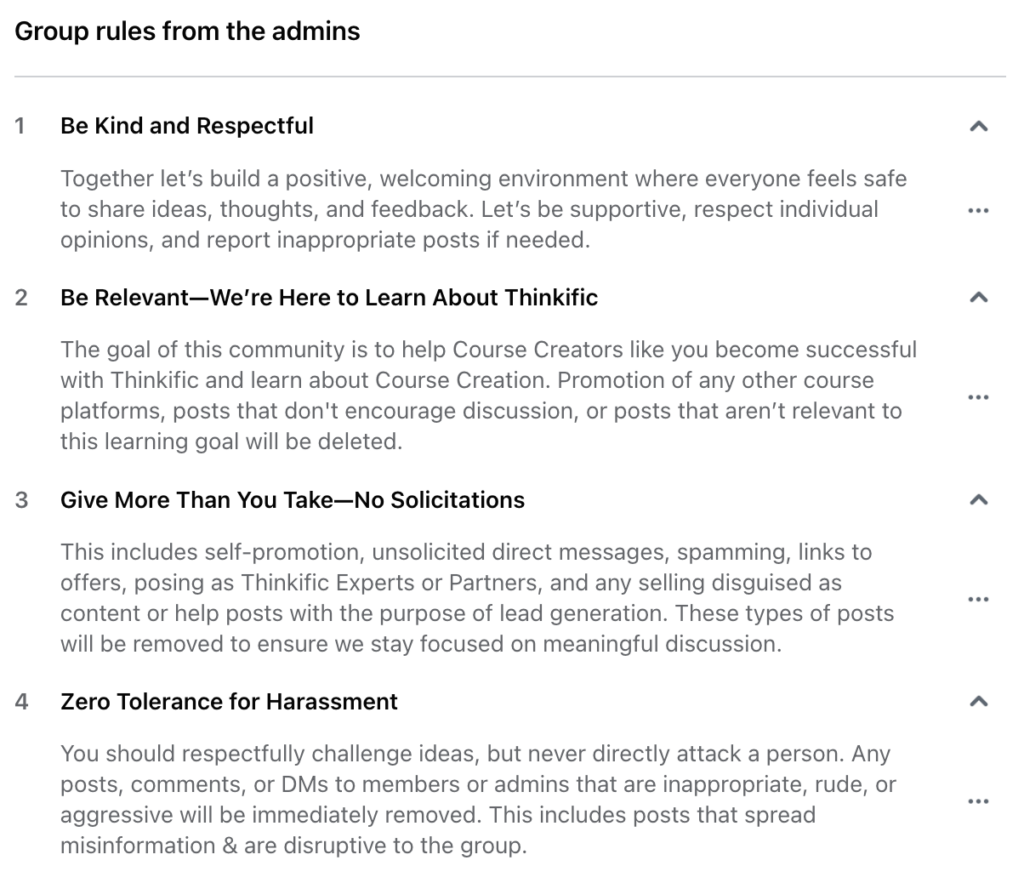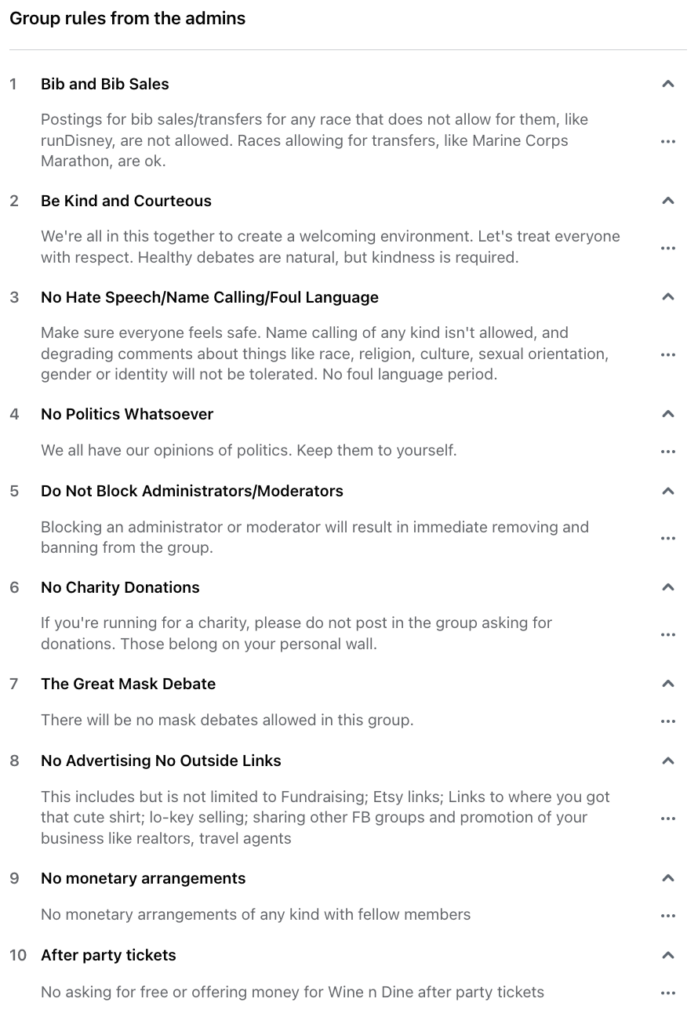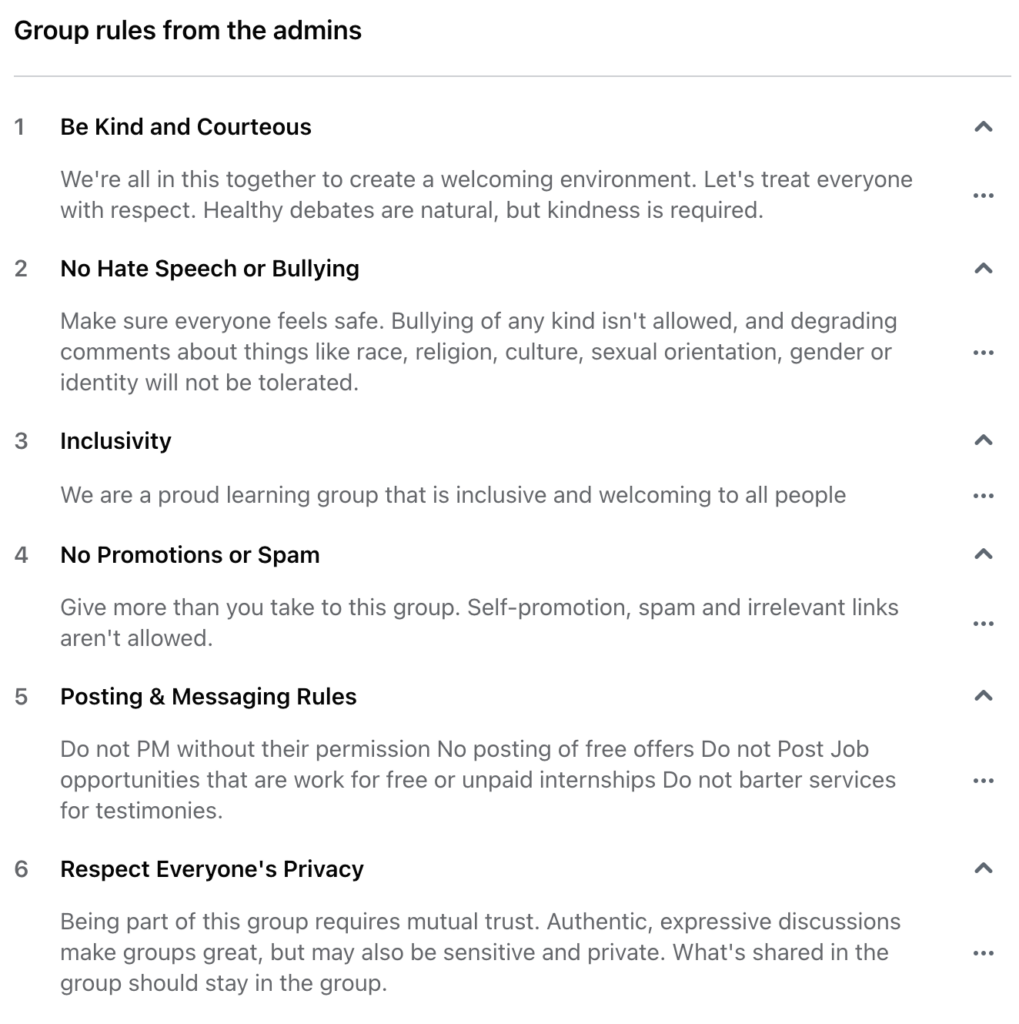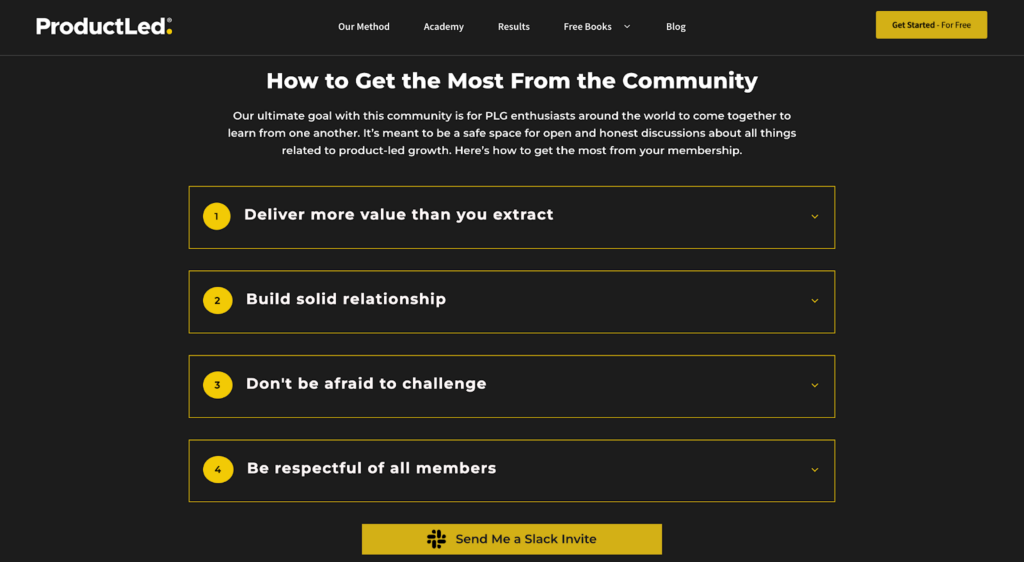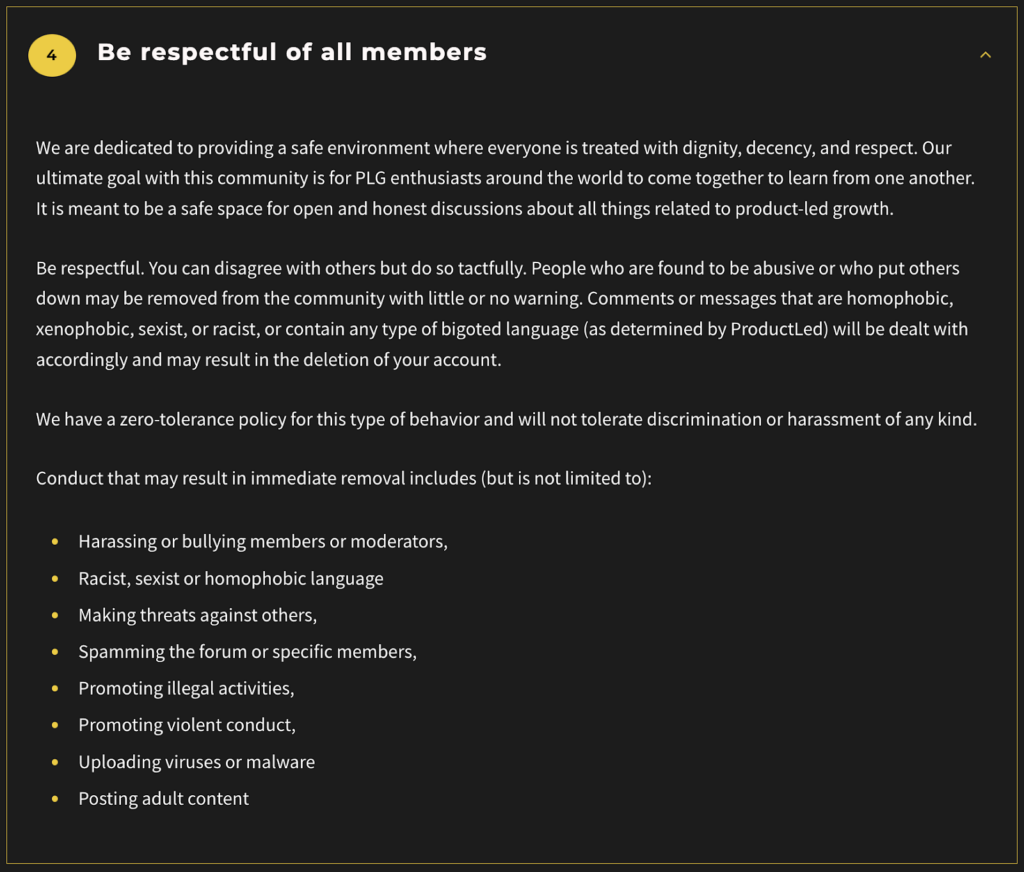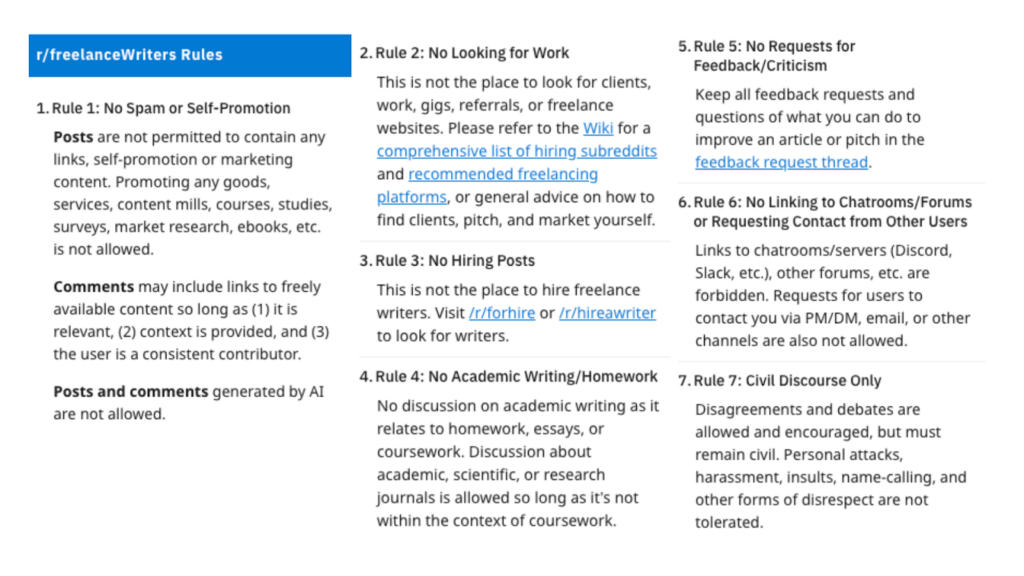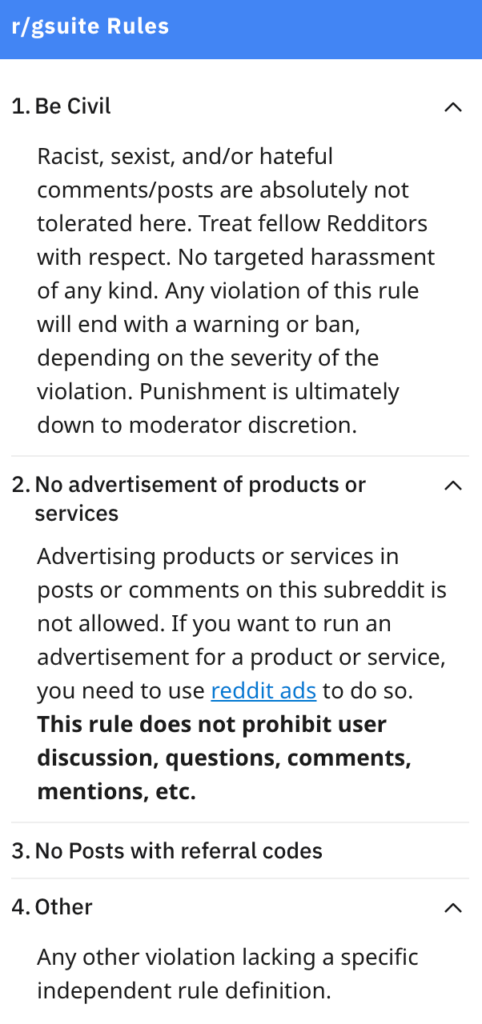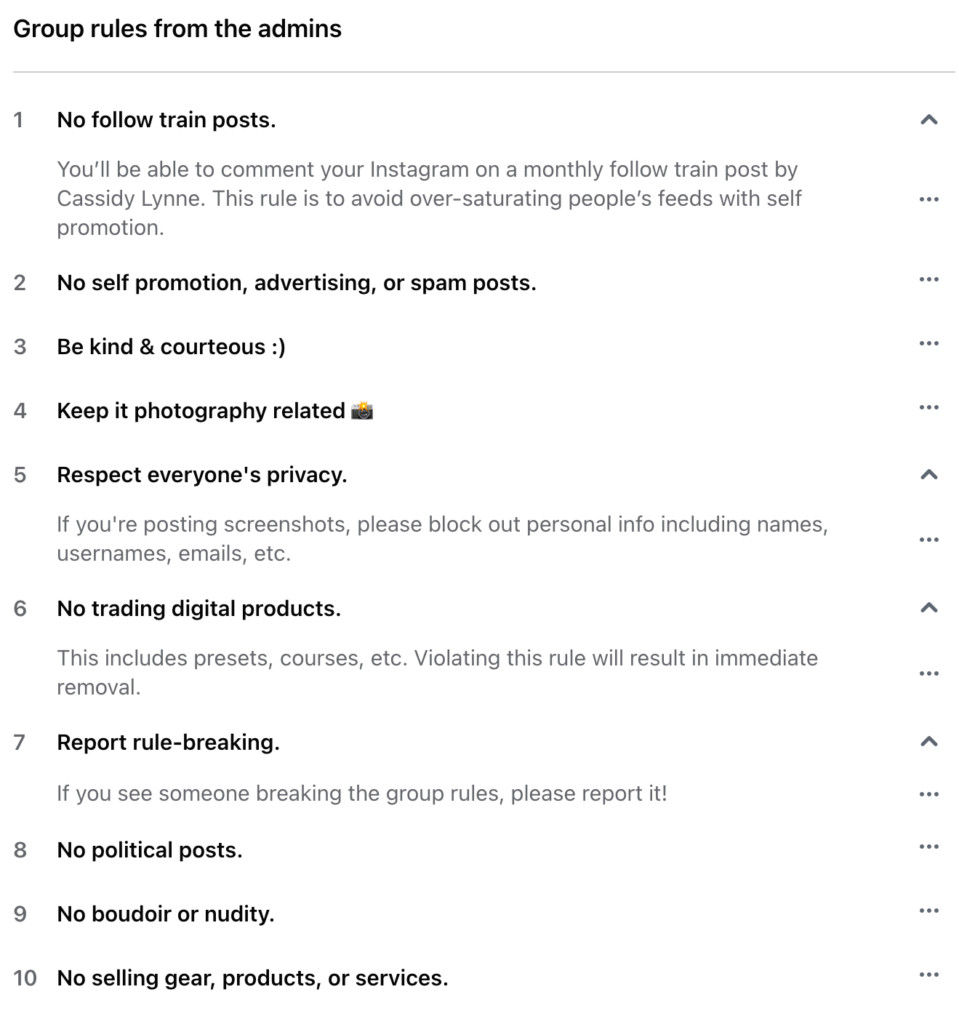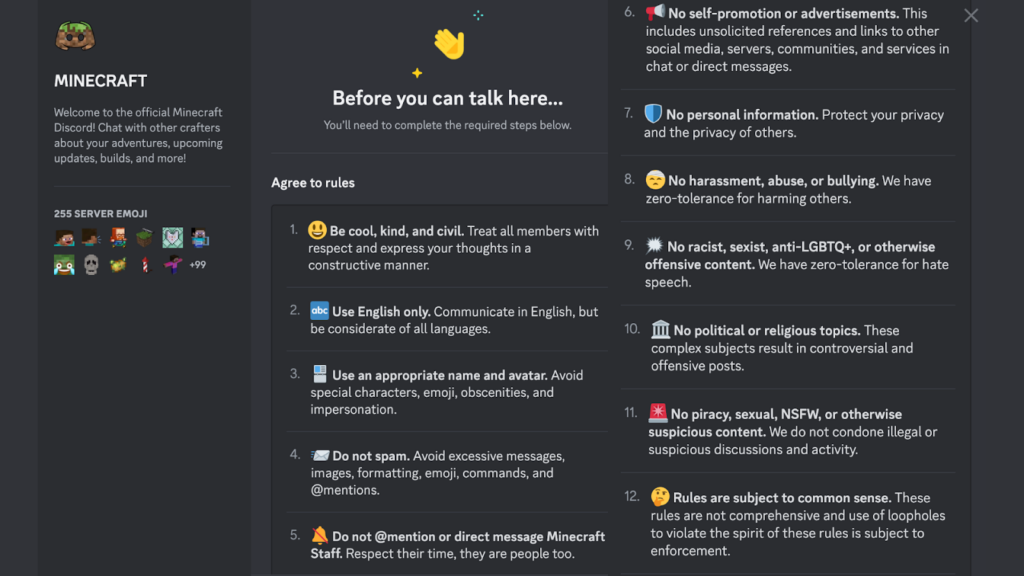Any type of community within a business is an invaluable asset for both large and small companies.
Higher Logic found that the average overall ROI for communities within businesses is a jaw-dropping 4,530%. Whether you’re a company of 10 or 1000 employees , building a work community (online or in-person) has perks.
Community rules are one of the first obstacles you’ll have to tackle in your journey to building a thriving community
Community rules are the shared guidelines or policies that dictate how you expect members of the community to behave. In this article, we’ll explain what makes community rules so important, share four critical areas you need to cover, and break down 9 community rules examples. Let’s dive in!
Pressed for time? Skip ahead using these links.
Why are rules in a community important?
Rules in a community are more than just a list of do’s and don’ts. Your rules are instrumental in promoting a sense of order and harmony and enabling group members to express themselves, interact, and safely engage with others.
If you’re unsure of where to begin, don’t worry! We’ll walk you through 9 key examples of rules in a community.
First, let’s jumpstart your brainstorming with these four essential principles that make up community rules:
- Safety and security – Maintaining the safety and security of your members is a broad undertaking. It encompasses cybersecurity and cyberbullying, ensuring your community members’ digital safety and emotional well-being. It often involves rules about privacy, anti-harassment, and harmful content control.
- Conflict and dispute – This involves establishing rules to ensure fairness and consistency while handling member conflicts. These rules should outline the roles of administrators and moderators and the consequences of rule violations.
- Inclusion and equality – The purpose of your community lies within its name – “unity.” The goal of building a community is to bring people together. To do that, a welcoming atmosphere must be established from the very beginning. Rules related to this ideal typically prohibit hate speech and discrimination.
- Social cohesion and cooperation – Emphasize the purpose of an online community and uniting people over shared interests. Rules promoting this encourage respectful communication, active participation, and consideration of others’ viewpoints.
Your community rules should balance clarity and flexibility. Clear rules set member behavior expectations, prevent confusion, and avert exploiters looking for loopholes.
However, over-specificity can lead to new loopholes — people are creative and can circumvent hyper-specific policies. Overall, avoid ambiguous rules that can confuse members and moderators alike, but don’t over-define to the point of inadvertently creating new gray areas.
9 Community Rules Examples
Now that you’re familiar with the essential areas your rules should cover, let’s look at 9 community rules examples. We’ll explore models from various platforms – including Facebook, Reddit, Discord, and Slack – to give you a sense of how rules work in the real world.
Thinkific Facebook community for online learning creators is a collaborative group guided by the core values of curiosity, kindness, and helpfulness. This community aims to facilitate meaningful connections, peer-to-peer learning, and help creators successfully create and maintain their online course businesses.
Thinkific Studio rules
This group was created in 2014 and now boasts over 33,000 members. Over the years, the community rules have been refined to just four rules. These rules are:
- Be kind and respectful
- Be relevant —we’re here to learn about Thinkific
- Give more than you take —no solicitations
- Zero tolerance for harassment
Learning points
Here are two things these rules do exceptionally well:
- Consequences for violators are clear – Each of these four rules explicitly states what will happen if a member violates the rules. These help members understand what’s acceptable and moderators understand how to take action.
- Constructive and respectful interaction is encouraged – Rather than focusing on what members can’t or shouldn’t do, the rules emphasize positive behaviors that will benefit the community.
runDisney is a massively popular online Facebook group. The group hosts an impressive 66,000 members, having only been created in 2020. This group’s goal is to foster community amongst people interested in or actively participating in runDisney races, both in-person and virtually. Community members regularly ask questions about training, share race-day tips, and celebrate accomplishments.
runDisney rules
Facebook allows groups to have up to 10 rules, and the runDisney Facebook group uses its total allowance. Its rules are:
- Bib and bib sales
- Be kind and courteous
- No hate speech, name-calling, or foul language
- No politics whatsoever
- Do not block administrators or moderators
- No charity donations
- The great mask debate
- No advertising or outside links
- No monetary arrangements
- No after-party ticket resales
runDisney learning points
runDisney’s rules are an excellent example of how communities can and should tailor their rules to their specific needs. Here are some things we noticed:
- Niche-specific rules cater to the community – Rule one (‘bib and bib sales’) is useful and highly specific to this community’s focus. The rule also defines when certain behavior is and isn’t acceptable.
- Necessary redundancy – Rule four (‘no politics whatsoever’) prohibits political conversation. However, the group likely faced an influx of mask debates during the pandemic as Disney implemented new policies for large gatherings. Today, rule seven (‘the great mask debate’) could probably be absorbed by rule four, but it likely was a necessary rule in years past despite its redundancy.
Start Shoot Grow Co. is a community by XayLi Barclay, one of Thinkific’s top course creators. This group focuses on building confidence in front of the camera, marketing, and selling your digital products. XayLi is a regular poster, often sharing advice, words of encouragement, video content, and workshops with her community members.
Start Shoot Grow Co. rules
Start Shoot Grow Co. launched in mid-2020 and is home to almost 3,000 members. Its rules are:
- Be kind and courteous
- No hate speech or bullying
- Inclusivity
- No promotions or spam
- Posting and messaging rules
- Respect everyone’s privacy
Start Shoot Grow Co. learning points
XayLi’s done an excellent job crafting her community rules. Here are two things we liked:
- Clear stance on discrimination – Xayli clearly defined what behavior isn’t allowed in her community, citing race, religious, cultural, sexual orientation, or gender discrimination as explicitly forbidden.
- Private messages are prohibited – Unsolicited messages aren’t allowed. This behavior is often considered spam-like but may not be evident to some. Many groups do not include this clause, despite it being common in online communities.
Product-Led Growth is a Slack community dedicated to “product-led veterans” and beginners. This group aims to bring together like-minded marketers, CEOs, and other leaders over product-led business philosophies. Like many Slack groups, community members can use any of the included Slack channels for self-promotion, support, education, and job hunting.
Product-Led Growth rules
The PLG community is home to over 15,000 users and sees regular daily engagement. And as the fourth community in our community rules examples list, we’re starting to see a trend; the PLG community also features only four community rules. They are:
- Deliver more value than you extract
- Build solid relationships
- Don’t be afraid to challenge
- Be respectful of all members
Product-Led Growth learning points
PLG’s Slack community rules are expertly framed as a method to “get the most from the community.” This is a smart and artful way to encourage members to adhere to the rules without feeling overly authoritative. Within the four Product-Led Growth rules, there are two things we really loved:
- Emphasis on value – Rule one (‘deliver more value than you extract’) encourages users to extract and deliver value while prohibiting self-promotion and ads, framing them as the opposite of valuable for the community. Additionally, rule three (‘don’t be afraid to challenge’) encourages productive engagement. This rule clarifies that the group values learning over ease and comfort, but not at the expense of safety and security.
- Strategic elaboration – Rules two (‘build solid relationships’) and three (‘don’t be afraid to challenge’) are concise , saying what they need to in a few words. However, when necessary, the writer behind these rules elaborates. Rule four (‘be respectful of all members’) is an excellent example of finding the balance between highly specific and ill-defined rules.
r/freelanceWriters is a Reddit group for freelance writers of all kinds, including content writers, copywriters, journalists, and more. The community shares one broad goal – to give freelance writers a space to share everything freelance-related. Users often ask questions about writing or managing a freelance business, seek feedback on their projects, or express concerns about changing economic conditions or technological advancements.
r/freelanceWriters rules
This thriving community consists of 124,000 members and was created in 2011. r/freelanceWriters features seven rules in total. Unsurprisingly, they’re remarkably concise without losing clarity. The rules are:
- No spam or self-promotion
- No looking for work
- No hiring posts
- No academic writing/homework
- No requests for feedback/criticism
- No linking to chatrooms/forums or requesting contact from other users
- Civil discourse only
r/freelanceWriters learning points
Moderators of this group are experienced writers in legal, medical, and business niches. As expected, this group’s rules are another example of how you can write specific rules while still leaving moderators and members with flexibility.
- Well-defined exceptions – Rule one (‘no spam or self-promotion’) explicitly prohibits self-promotion and the inclusion of links in posts. However, the rule also allows for specific exceptions to those who regularly bring valuable engagement to the community, giving members and moderators occasional flexibility.
- Niche-specific rules protect the community – Rule four (‘no academic writing/homework’) is another example of a rule not every community needs. Notably, it’s the only rule in this group prohibiting an entire category of writing, likely because it addresses a truly niche-specific problem the community has faced in the past. This rule helps define the community’s goals while protecting it from potentially harmful posts – all without limiting productive, valuable members.
r/gsuite is a Subreddit with over 18,000 members. It was created in 2016 and is dedicated to helping Google Workspace, formerly G Suite, users navigate Google’s various apps.
r/gsuite rulesLike Thinkific, this Google Workspace Subreddit features only four community rules. They are:
- Be civil
- No advertisement of products or services
- No posts with referral codes
- Other
r/gsuite learning points
While this Subreddit’s rules cover a lot of ground, they also avoid defining certain violations and consequences, creating ambiguous rules.
- Consequences are up to moderator discretion – Rules one (‘be civil’) and four (‘other’) leave a lot to moderator discretion. While this can be an effective way to manage some communities, it can also lead to significant variations in consequences depending on who moderates and when.
- “Other” clause – This clause gives moderators flexibility to deal with unforeseen circumstances, but it’s likely too ambiguous. In an attempt to cover all possible territory, this rule leaves a lot up to the moderator. One moderator may deem a certain action a violation, while another may not.
Cassidy Lynne Education is led by Cassidy Lynne, one of Thinkific’s creators making over 20k per month. This Facebook community aims to give photographers the space to learn, grow, and participate in a community with others. You’ll find community members asking how to compose shots, checking in with each other, and looking for editing advice on any given day.
Cassidy Lynne Education rules:
Cassidy Lynne Education boasts over 25,000 members and was created in early 2021. This group features 10 rules:
- No follow-train posts
- No self-promotion, advertising, or spam posts
- Be kind and courteous
- Keep it photography related
- Respect everyone’s privacy
- No trading digital products
- Report rule-breaking
- No political posts
- No boudoir or nudity
- No selling gear, products, or services
Cassidy Lynne Education learning points
Cassidy’s group rules are short and sweet without sacrificing clarity. Here are two things you can learn from her rules:
- No follow train posts – This rule exemplifies basic community rules and laws allowing for specific exceptions – having one controlled monthly follow train post in the group. In this case, Cassidy recognizes that many of her members want to follow each other on other platforms. Rather than letting that style of post become saturated and run unchecked on the main feed, she provides an exception to the rule with a monthly post, giving her members what they crave without sacrificing the integrity of her group.
- Redundancy – Rule two (‘no self-promotion, advertising, or spam posts’) and rule ten (‘no selling gear, products, or services’) appear to cover nearly identical topics. Combining these two rules would make the list more concise without sacrificing clarity.
The Minecraft Discord is a community for Minecraft enthusiasts on the Discord platform. The community aims to unite players of all ages over their love for the famous, multi-platform game. In this community, you’ll find users engaging on one of over 50 threads, discussing anything from Minecraft pet pictures to building contests.
Minecraft Discord rules
This community consists of 971,000 online members and was created in 2017. Its rules are:
- Be cool, kind, and civil to one another
- Please speak English only
- Keep your Discord profile appropriate
- Do not spam
- Do not @mention or direct message Minecraft staff
- No self-promotion or advertisements
- No personal information
- No hate speech or harmful language
- No political or religious topics
- No piracy, sexual, NSFW, or otherwise suspicious content
- Rules are subject to common sense
Minecraft Discord learning points
As a community that includes young adults, this community’s rules are a great model for groups in similar positions. Here’s what we think you should takeaway:
- Profile appropriateness – Rule three (‘keep your Discord profile appropriate’) addresses an issue unique to groups with young members and aims to elaborate on any gray areas that may exist with some of the following rules in the list.
- Common sense clause – Unlike “other” clauses, or catch-all clauses, this group’s common sense clause gives moderators the flexibility to moderate violators without creating significant ambiguity.
#Eventprofs is a private online community for event professionals to share ideas, seek support, and network with other event professionals. This community is housed on a new community platform called “Circle” and offers weekly newsletters, content, discussions, in-depth user profiles, direct messaging, and more. You can find members discussing strategy, the latest event trends, and event technology.
#Eventprofs rules
The #Eventprofs community is rapidly growing, with members in over 100 countries. Like several other communities in this list, they too feature four community rules:
- Treat others as you would like to be treated
- No self-promoting
- Educational content may be shared when not promotional
- Profiles are for people, not companies
#Eventprofs learning points
As a community led by event industry professionals, we think there are some excellent takeaways for community leaders here.
- Emphasis on values – We love how #Eventprofs present their community rules as part of a larger member commitment, really emphasizing the member’s role in the greater community. It’s also noteworthy that before the ‘community rules’ part, a section is added for ‘community values,’ highlighting what the group is about before digging into the “do’s and don’ts.”
- Distinguishing value – Rule four (‘profiles are for people, not companies’) is unique to this community and distinguishes that the group seeks value from individuals rather than from larger entities. This is another example of a rule that defines and protects the community rather than limiting what its intended members can do.
Common questions
Does anything happen if a member doesn’t follow the community rules?
Community rules are established to ensure that all group members have an enjoyable experience and actually want to be a part of the community.
If members aren’t following the rules, this can create an unpleasant experience for the rest of the group – which may result in the removal of members who aren’t adhering to or respecting the group rules. Of course, this decision is up to the group moderator, so consequences can vary if a rule is broken.
Most online community groups have rules that won’t result in any legal action taken against you if a rule is broken – just be extra wary if you are a part of a community where this is possible.
In our opinion, it’s best to stick on the safe side and follow the community rules so that everyone has a great experience in the community.
Are you allowed to change or modify rules in your own community group?
What’s that saying… my house, my rules!
You are definitely able to change or modify your own community rules as you see fit – this is your community, and altering the rules just means that you are paying close attention to the evolving needs of your group.
Listening to the members of your group is also a great way to get feedback on your rules. Someone may suggest something that you would have never noticed as a moderator/admin person in the group. Posting group polls can also let you know how your group is doing, and what kind of rules they may like to see in the community.
Also, finding a set of rules that fall within your community values may take some time. Feel free to change the rules as much as you’d like until you find rules that truly resonate with your community.
Can there be exceptions to violations of community rules?
Ultimately, community rules are different depending on the type of community you’ve created. If you are leading your own community and you notice that someone breaks a rule, you could either have more of a lenient stance and offer them warnings, or you could be more strict depending on the nature of the rule being broken.
Exceptions to violations of community rules are up to the discretion of the group creators. Although if the community is large enough and a member violates a rule, they may just be automatically removed from the group since there are more than enough members (who follow the rules) to keep the community thriving.
Some communities will have a zero-tolerance policy, while others will allow for some exceptions and second-chances to be given.
If you are creating your own community, keep in mind how you think you might handle different scenarios when it comes to your own community rules.
Ready to start writing your own community rules?
It’s time to give your own community a set of rules to adhere to – feel free to use these aforementioned community rules examples when creating your own list.
Whether you’re writing rules from scratch or giving your current rules a much-needed makeover, establishing a clear, comprehensive, and custom set of rules can help your members navigate and get the most from your community.
Unlock your business' full potential with a free online community Get your first Thinkific Community free and start growing your business, streamlining your workflow, and connecting with your audience — all in one place.




